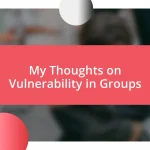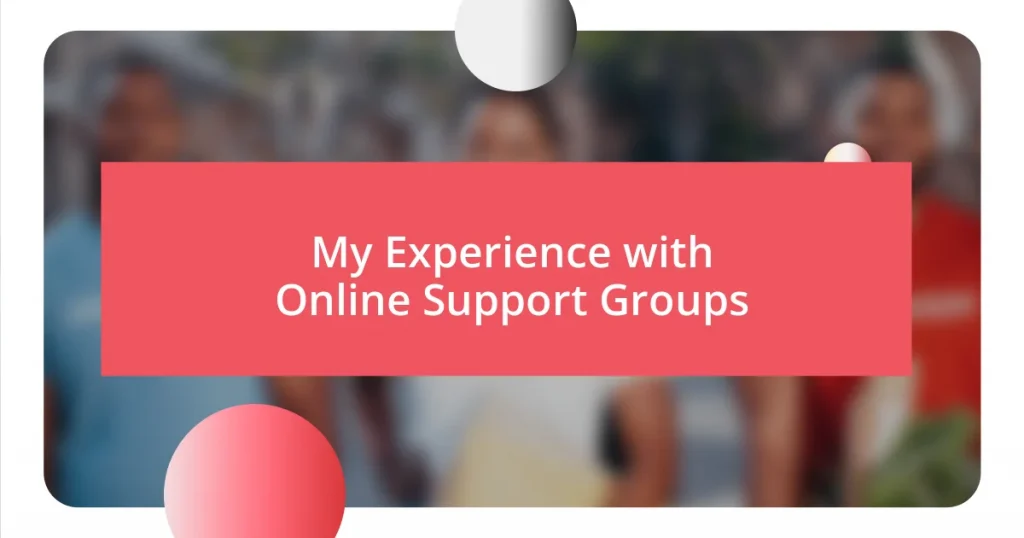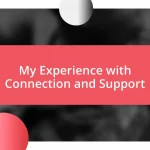Key takeaways:
- Online support groups offer a safe, anonymous space for sharing experiences, fostering emotional connections and a sense of community.
- Choosing the right support group involves finding one that shares specific challenges, has a balanced structure, and is facilitated by engaged leaders.
- Active participation, vulnerability in sharing stories, and post-group reflection can drive personal growth and transformation following group experiences.
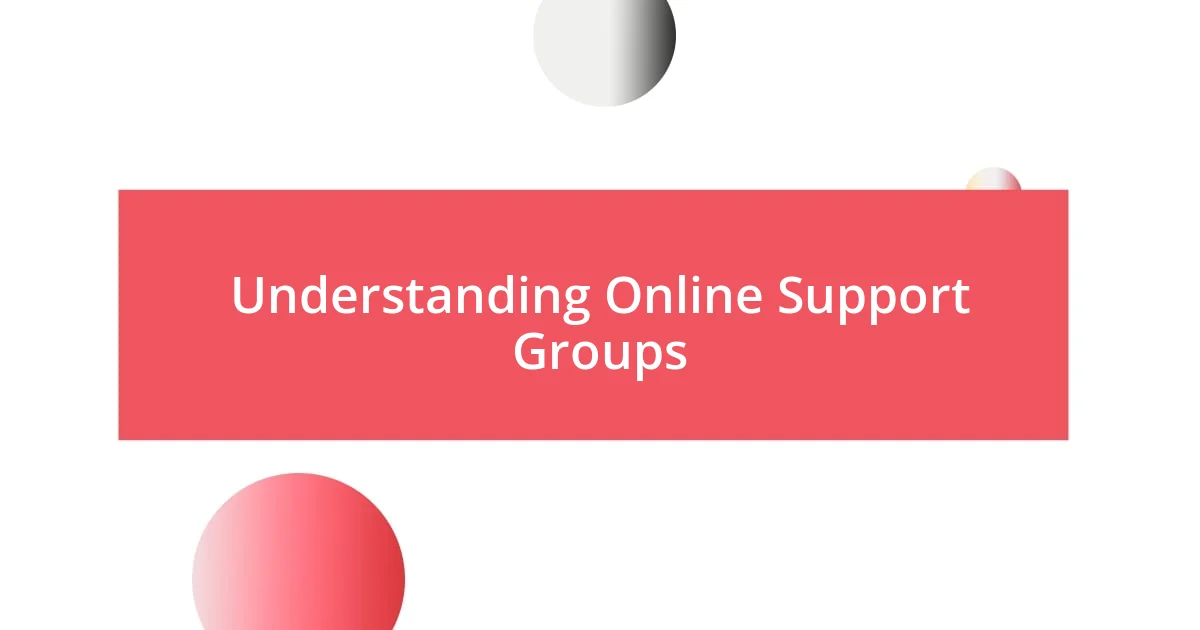
Understanding Online Support Groups
Online support groups are digital spaces where people facing similar challenges gather to share their experiences and seek comfort. I remember joining one after a particularly tough week; logging in felt like stepping into a warm, understanding embrace. Have you ever needed a safe space to voice your feelings without fear of judgment? That’s exactly what these groups provide.
What’s fascinating about online support groups is their accessibility. Participants can connect from anywhere, which breaks geographical barriers. During my experience, I’d log on at odd hours, often finding someone from a completely different time zone ready to listen. It was a comforting realization that a shared struggle transcends distance, reminding me we are never truly alone.
Moreover, the anonymity allowed people to open up in ways they might not in person. I once shared a vulnerability I rarely spoke about, and the flood of supportive messages truly moved me. Have you ever felt a weight lifted off your shoulders just because someone else understood? That’s the magic of these groups; they transform isolation into connection, fostering healing and friendship.
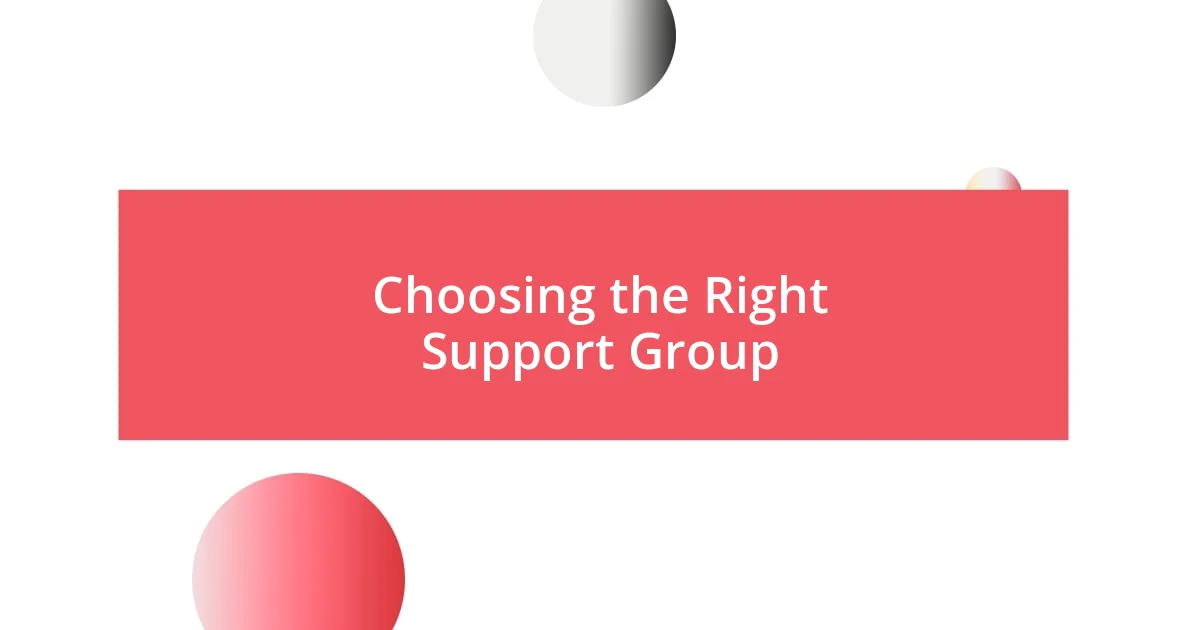
Choosing the Right Support Group
Choosing the right support group can feel daunting, but I’ve learned a few strategies along the way. For me, it was essential to find a group that resonated with my specific struggles. I remember scrolling through various options, and one particular group caught my eye, based on shared experiences that mirrored my own. Have you ever felt like a group was “speaking” directly to you? That connection made all the difference.
As I navigated different support options, I quickly realized that not all groups are created equal. Some were overly structured, while others felt like floating conversations without direction. I joined one that balanced both; it had a loose framework but always encouraged meaningful sharing. I often reflect on how group dynamics can shape our experience—finding a space that feels right truly enhances the healing process.
Another aspect I found helpful was the facilitator’s approach. I participated in groups led by empathetic individuals who actively encouraged participation, creating a welcoming environment. Conversely, I also stumbled upon a few where the moderator seemed disengaged, leaving participants feeling lost. For me, observing how one guided the discussion often determined if my heart was in it or if I’d rather search for a better fit.
| Key Factors | My Experience |
|---|---|
| Shared Experiences | The group I chose resonated with specific challenges I faced, creating an immediate sense of belonging. |
| Group Structure | I thrived in a group that balanced free conversation with structured support, which helped focus our discussions. |
| Facilitator Engagement | The most impactful groups had genuinely interested facilitators who made everyone feel valued and included. |
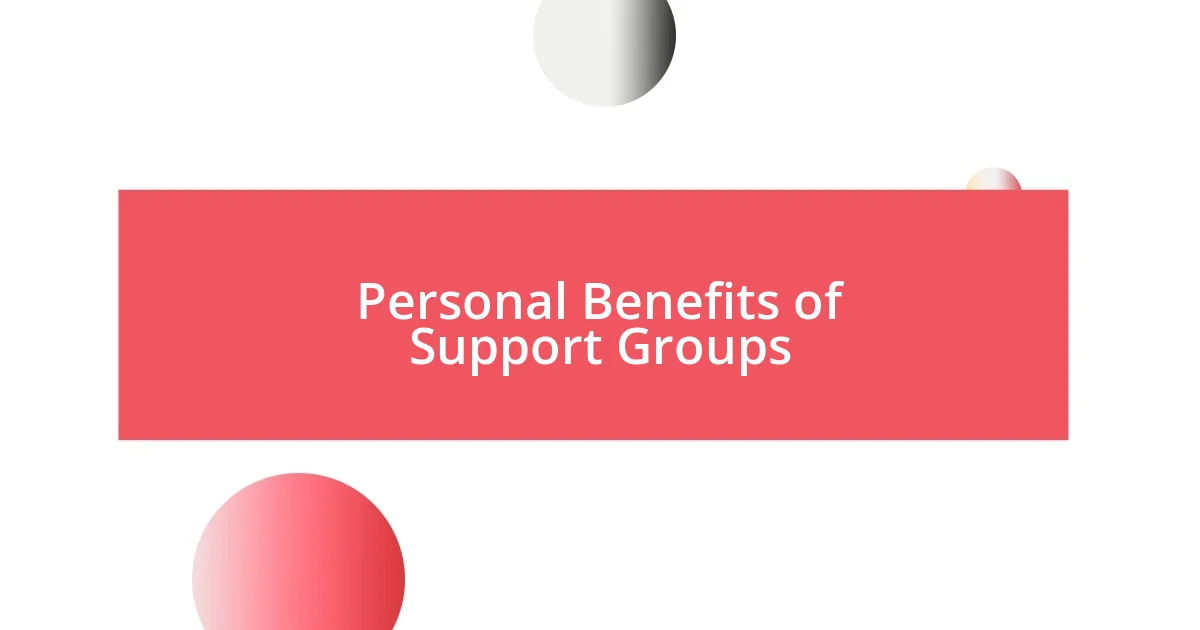
Personal Benefits of Support Groups
I truly believe that the personal benefits of support groups are profound and multifaceted. I vividly remember the first time I shared my story in a group. The collective nods and knowing glances made me feel seen and understood in a way I hadn’t experienced before. It’s moments like these that foster a sense of belonging, transforming feelings of isolation into a powerful sense of community. When we hear others share their journeys, we often see pieces of ourselves reflected in their words, which can be incredibly validating.
Here are some specific benefits I encountered along my journey:
- Emotional Validation: Acknowledging my feelings among others who understood was therapeutic.
- Practical Advice: I received tips from members who had navigated similar challenges, which I found incredibly helpful.
- Increased Resilience: Hearing uplifting stories from others inspired me to keep pushing through tough times.
- Accountability: Engaging regularly with the group motivated me to stay committed to my personal goals.
- Friendship Formation: Some members became friends beyond the group, offering support outside of our scheduled meetings.
the warmth and understanding I found resembled a family gathering rather than a formal meeting. Each session became a safe space for tears, laughter, and everything in between, underscoring how essential compassion is in times of struggle.
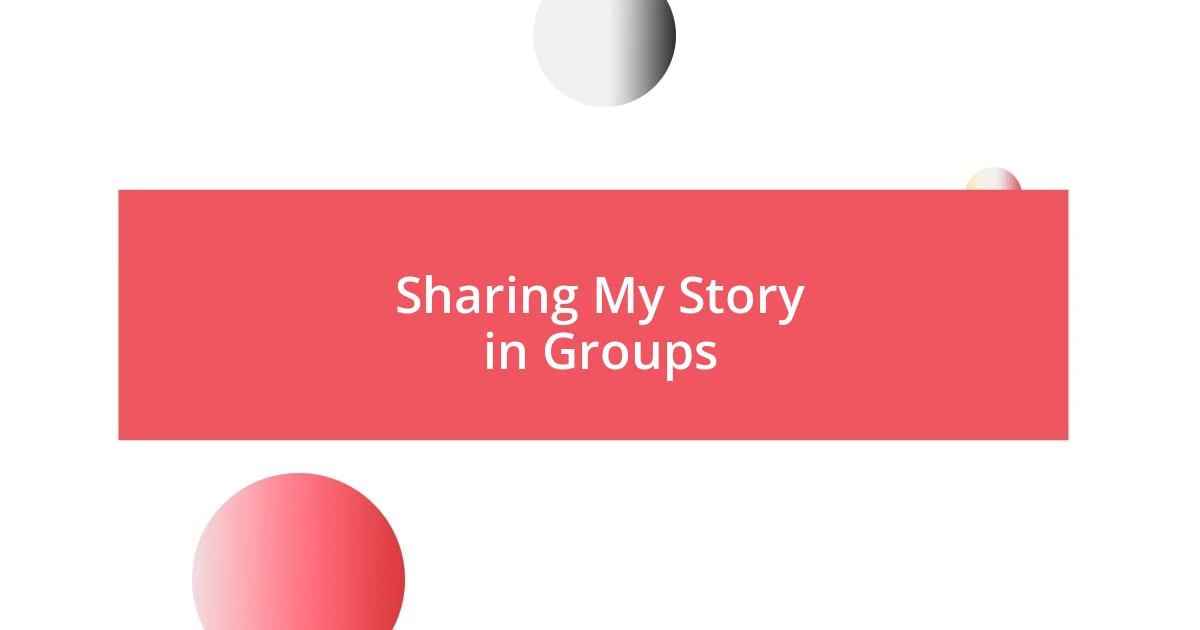
Sharing My Story in Groups
When I first joined the online support group, I hesitated to share my story. I imagined the worst—what if they didn’t understand? But once I opened up about my experience, something shifted. I was met with a wave of support that felt palpable, as if each member was leaning in, eager to connect. The relief I felt was immediate; it made me realize how important it is to express our truths.
What surprised me was the power of vulnerability. As I shared my challenges, others reciprocated, revealing their own journeys with raw honesty. I remember one member, who had such a similar experience, spoke about her struggles with shame and isolation. Hearing her reminded me just how universal our feelings can be. Didn’t that make you wonder how many others feel the same but haven’t found their voice yet?
The camaraderie formed through storytelling was something I never expected. It felt like a dance of shared experiences, where every story added depth to our group dynamic. I found strength in knowing that my story could inspire another while being inspired in return. It’s amazing how sharing our journeys doesn’t just lighten our own burdens but also strengthens the collective spirit of the group. That sense of connection has been one of the most rewarding parts of my experience.
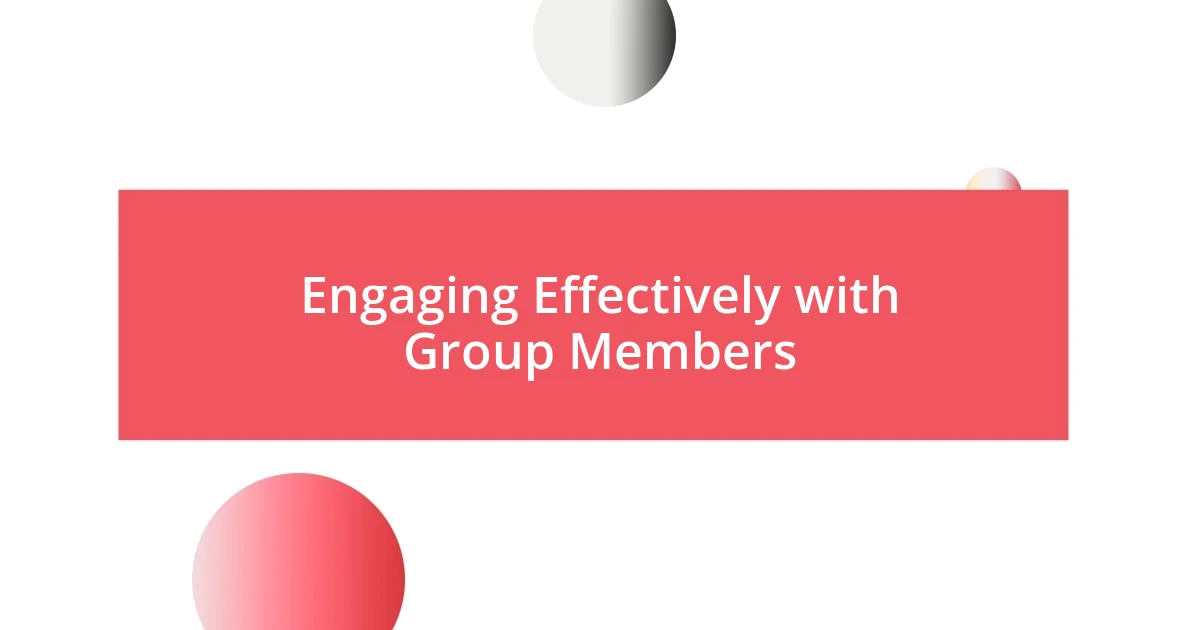
Engaging Effectively with Group Members
Engaging effectively with group members is all about authenticity and openness. I recall a moment when I decided to ask a fellow member how she coped during particularly challenging times. Her response not only offered me a fresh perspective but also sparked a lively discussion that brought us closer. Think about it: how often do we truly take the time to ask one another about our coping strategies? It’s these small inquiries that can cultivate deeper connections.
Another key aspect is actively listening. I remember sitting in a meeting when one member shared a story that resonated deeply with my own experiences. Instead of waiting for my turn to speak, I focused entirely on her words, absorbing the emotions and lessons. The impact was palpable—a sense of solidarity, of shared struggle. Have you ever noticed how powerful it feels to be truly heard? This act of listening not only validates others but also creates a richer dialogue within the group.
Moreover, I found that participating in group activities or discussions sparked a vibrant energy that influenced everyone’s engagement. Once, when we initiated a writing prompt about our fears, it opened a floodgate of emotions and ideas. People who usually remained quiet suddenly found their voices, revealing insights no one expected. Isn’t it fascinating how a little creativity can unearth such depth? These moments of shared participation have been pivotal in forming lasting bonds within the group.
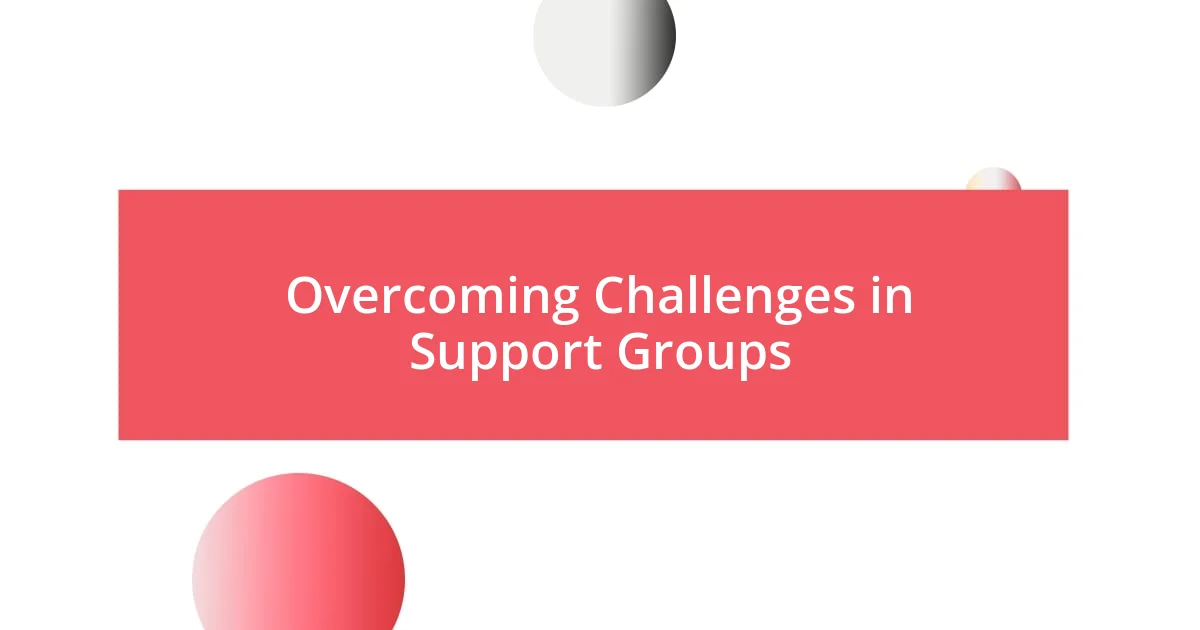
Overcoming Challenges in Support Groups
Overcoming challenges in support groups often requires confronting our own fears and insecurities directly. I vividly remember the first time I faced a challenging moment when a discussion got unexpectedly emotional. A member shared a particularly painful story that stirred something deep within me. As I watched tears well up in her eyes, I realized that it was okay to feel vulnerable; it was a reminder that we’re all navigating our emotional landscapes together.
Then there’s the issue of differing opinions. It’s natural to encounter conflict, but I learned that navigating these conversations can actually be a growth opportunity. I once found myself in a heated discussion where opinions clashed, yet, I took a step back and reminded myself that different perspectives enrich our conversations. By focusing on empathy and understanding rather than winning the argument, I could foster a more inclusive atmosphere. Have you ever navigated a tricky interaction that left you feeling more enlightened than before?
Lastly, it’s important to acknowledge the potential for burnout. I found myself at one point feeling overwhelmed by the emotional weight of sharing and listening. To counteract this, I made sure to practice self-care and set boundaries around my participation. This decision allowed me to return to the group feeling refreshed and more engaged. Isn’t it interesting how sometimes, taking a step back can lead to a stronger comeback? Balancing our emotional investment is key to sustaining our support journey.
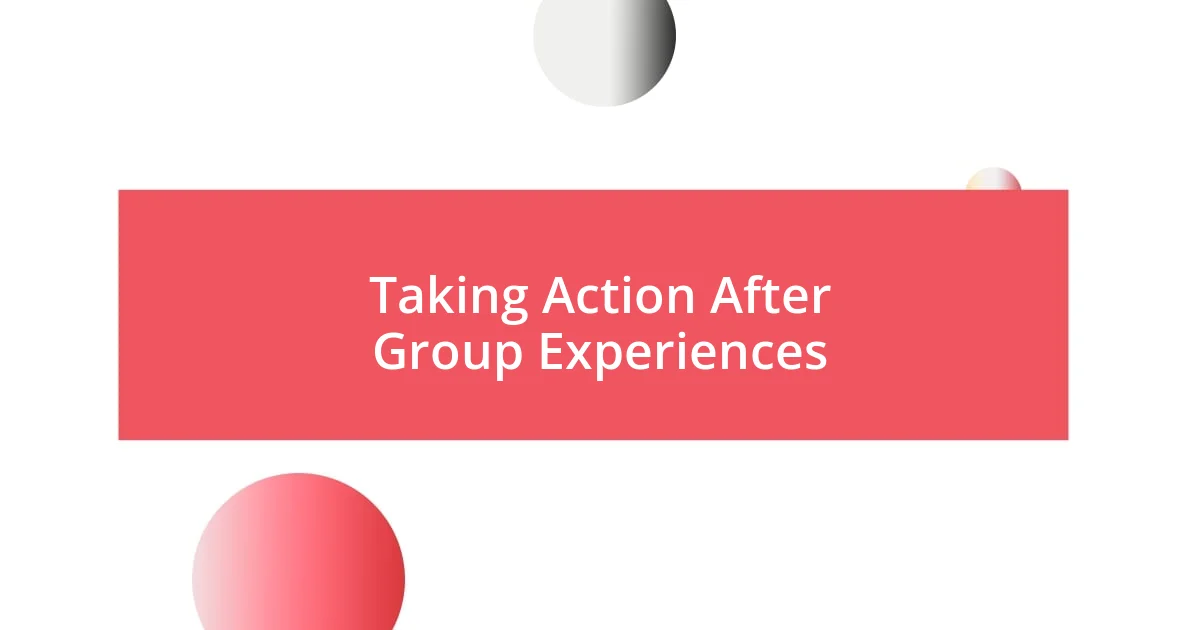
Taking Action After Group Experiences
Taking action after group experiences can be transformative. For instance, after a particularly poignant session, I felt a surge of inspiration to implement some of the strategies discussed. Instead of waiting for life to happen to me, I made a list of tangible steps I could take to improve my situation. Have you ever felt that urge to act immediately after an enlightening conversation? It’s like the group provides a launchpad for real change.
I remember leaving a meeting one night, my mind buzzing with new ideas. Compelled to solidify that motivation, I emailed a few members to organize a new project we had brainstormed. The response was overwhelmingly positive, and the collaborative spirit ignited a sense of purpose and accountability among us. Doesn’t it feel empowering to not only absorb knowledge but to put it into practice together? That synergy can elevate our collective experience to new heights.
Moreover, following those group discussions, I always found it essential to reflect on what resonated most with me. Reflecting on those insights helps to internalize valuable lessons. One time, after contemplating a member’s journey through grief, I decided to dedicate an evening each week to artistic expression as a form of healing. Have you ever tried channeling your emotions into creativity? The act itself became a personal refuge, showing me that taking action is not just about doing—it’s about discovering and nurturing our true selves.









